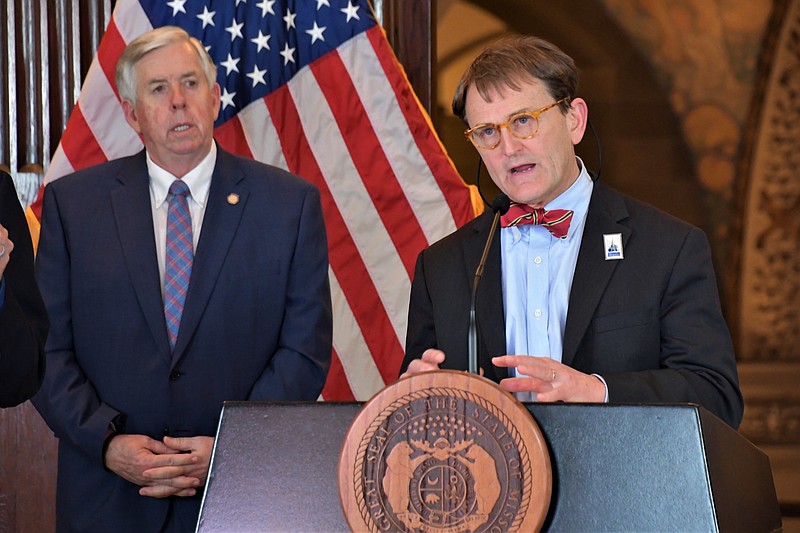[<a href="https://www.newstribune.com/news/health/" style="color:#33AEFF">access the News Tribune Health section</a>]
One of the infectious disease doctors advising Missouri Gov. Mike Parson outlined Wednesday how Missourians' experiences with health care providers may be different as the state begins to ease restrictions on movement amid the COVID-19 pandemic.
Dr. Robin Trotman, medical director of infectious diseases at CoxHealth in Springfield, is one of seven infectious disease and critical care doctors who are part of a COVID-19 advisory panel Parson is working with.
Trotman said the group regularly meets virtually, "and the suggestions and observations that we've made over time have been heard by the state. We've seen these things implemented, we've seen policies come out of these discussions, and it's something that I'm happy and proud to be part of."
"I think that this has afforded us time to prepare for a surge of patients" across the state, he added - though social distancing interventions have prevented COVID-19 from spreading as far as it could have and have reduced the number of patients health care systems have had to treat.
Still, most health care not directly related to the pandemic has been postponed for weeks.
Medical care remained an acceptable reason for travel under the statewide stay-at-home order that's in effect through May 3, but many hospitals canceled all elective procedures - which also caused severe financial losses for hospitals.
People will have to resume their standard medical care, and "I want people to know that the health care systems are safe," Trotman said.
However, though people don't need to be afraid, Trotman said, they should expect things to be different as they re-enter the system "on a slow, calculated basis."
"You might sit in your car, and you might make a phone call before you enter. You might be called in instead of sitting in a crowded waiting room. The offices are clean; the health care workers are being screened for symptoms," he said.
"As we release some of these restrictions, and as the health care system starts to normalize again, there may be bumps in the road. We may see blips in disease, but we're going to be aware of those; we're following those, along with health departments, and we may even have to resume some minor restrictions in movement as we release some.
"If people will be patient with us - this is going to be a long haul. I know that lifting the shelter-at-home (order) is going to be, it's going to be an answer to prayers, but this is all contingent on people around our state adhering to those same fundamental principles of keeping your distance from people, being aware of your surroundings, not going to work if you're sick. These little things like hand hygiene - maybe you still wear a mask in public - those are going to afford us the ability to continue to release these restrictions on our movement," Trotman said.
State leaders on Wednesday announced further measures to aid health care, including a Battelle decontamination system that uses vaporized hydrogen peroxide to sanitize N95 respirator masks up to 20 times for each mask and that can handle up to 80,000 masks a day.
Masks dropped off by health care providers and first responders at 13 drop-off and pick-up sites throughout the state will be transported by biohazard courier to the temporary site in Jefferson City of the decontamination system, according to a news release from Parson's office.
The system is fully funded by the Federal Emergency Management Agency and U.S. Department of Health and Senior Services, and "the Battelle system is completely safe while in operation to the surrounding community."
It's anticipated the system will be used for at least six months, and Battelle is continuing to research other types of personal protective equipment that could be decontaminated by the process.
Health care or first responder organizations interested in using the system can enroll at battelle.org/N95.
Missouri also expanded criteria for COVID-19 testing that can be handled by the state's public health laboratory.
Dr. Randall Williams, director of the Missouri Department of Health and Senior Services, said the new criteria reflects the state's strategies going forward "to box in new outbreaks as they arise."
Williams said the new criteria allows for everyone - staff and residents, symptomatic or not - at congregate facilities to be tested, and more first responders will also be able to be tested.
As of 5 p.m. Wednesday, DHSS had not yet updated the testing criteria document on its website with more details.
As of Wednesday afternoon, DHSS had reported 6,137 COVID-19 cases in Missouri, with 208 deaths.

